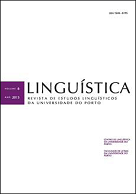Noms épithètes dans les expressions binominales
Resumo
Les adjectifs ont la propriété exclusive d’être des modifieurs attributifs (ou épithètes) du nom. Cette exclusivité leur permet d’intégrer le DP en tant que modifieurs de la tête lexicale N, tout en partageant ses traits flexionnels. Certains modèles de conversion permettent cependant la projection d’un DP pourvu de deux têtes nominales en relation de modification. Se dissociant de propositions précédentes en portugais (Rio Torto 1998, Villalva 2003, Ranchhod 2003), notre analyse implique que certaines séquences endocentriques N1N2, comme « criança modelo » ou « império fantasma », correspondent en fait à une structure modifiée, dans laquelle N2 serait un «nom attributif » (Martinho 2007). Dans ces «constructions binominales modifiées » N1N2, habituellement classées comme des cas d’ «adjonction», nous considérerons, en nous fondant sur un corpus constitué d’extraits de la base de données informatisée CETEM, que N2 correspond à une catégorie mixte. Étant donné que N2 vérifie certaines propriétés de base des adjectifs (par exemple, N2 accepte la modification multiple, la position prédicative et la préfixation adjectivale), nous préciserons que cette catégorie mixte équivaut à un modifieur adjectival. Par ailleurs, puisque N2 ne satisfait que partiellement à ces mêmes propriétés (par exemple, N2 n’a pas de degré), nous conclurons que, dans ce processus de modification commun à toutes les langues romanes (Fabre 1996, Villoing 2002, Savary 2004, Montermini 2006), l’épithète nominale N2 est convertie en adjectif relationnel (Demonte 1999).
Referências
Anward, J. 2000. A dynamic model of part-of-speech differentiation., in Approaches to the Typology of Word Classes, Vogel, Petra M. & Comrie, Bernard (Eds.), Mouton de Gruyer.
Bhat, D.N.S. 1994. The adjectival category: Criteria for differentiation and identification. (Studies in Language Companion Series 24.) Amsterdam: Benjamins.
Bosque, I. & Picallo C. 1996. Postnominal adjectives in Spanish DPs, Journal of Linguistics, 32, 349-385.
Coyos, J.-B. 2004. Basque, in Le nom composé: Données sur 16 langues, Arnaud, Pierre J.L. (Ed.), Lyon: Presses Universitaires de Lyon, 47-70.
Croft, W. 1990. Conceptual framework for grammatical categories (or, a taxonomy of propositional acts), Journal of Semantics, 7, 245-279.
Demonte, V. 1999. A Minimal Account of Spanish Adjective Position and Interpretation. In Franco J., Landa A. & Martín J. (Eds.), Grammatical Analyses in Basque and Romance Linguistics, Amsterdam, John Benjamins.
Fabre, C. 1996. Interprétation automatique des séquences binominales en anglais et en français. Application à la recherche d’informations, thèse de doctorat, Université de Rennes.
Kleiber, G. 1990. La sémantique du prototype, Paris: PUF.
Martinho, F. 1998. A Elipse Nominal em Português e Francês, dissertation de Maîtrise, Universidade do Porto.
Martinho, F. 2007. Sintaxe e semântica dos adjetivos graduáveis em Português, dissertation de doctorat, Universidade de Aveiro.
Montermini, F. 2006. La Composition en Italien dans un Cadre de Morphologie Lexématique, communication présentée à la Journée d’études "Composition", Arras, 24 mars 2006.
Pysz, A. 2007. The structural location of adnominal adjectives: Prospects for Old English, Journal of Theoretical Linguistics, nº5, 59-85.
Ranchhod, E. 2003. O lugar das expressões ‘fixas’ na gramática do Português, in Razões e Emoção, Miscelânea de estudos em homenagem a Maria Helena Mira Mateus, Castro, I. & Duarte, I. (Eds.), Vol. II, Imprensa Nacional-casa da Moeda, 239-254.
Ribeiro, S. 2010. Compostos nominais em português. As estruturas VN, NN, NprepN e NA. München: LINCOM (LINCOM Studies in Romance Linguistics 64).
Rio-Torto, G.M. 1998. Morfologia Derivacional. Teoria e Aplicação ao Português, Colecção Linguística 12, Porto Editora.
Rio-Torto, G.M. & Ribeiro, S. 2012. Portuguese Compounds. Probus 24: 119-145.
Savary, A. 2004. Recensement et description des mots composés – méthodes et applications, Thèse de doctorat en Informatique Fondamentale, Laboratoire d’Automatique Documentaire et Linguistique, Université Paris 7.
Scalise, S. & Bisetto, A. 2009. Classification of compounds. In R. Lieber & P. Stekauer (Eds.), The Oxford Handbook of Compounding, Oxford: Oxford University Press, 49-82.
Uehara, S. 1998. Syntactic categories in Japanese: A typological and cognitive introduction. Tokyo: Kurosio.
Villalva, A. 2003. Formação de palavras: composição, in Mateus, M. H., Brito, A.- M., Duarte, I., Frota, S., Matos. G., Oliveira, F., Vigário, M. & Villalva, A., 2003, Gramática da Língua Portuguesa, série Linguística, Caminho.
Villoing, F. 2002. Les mots composés [VN] N/A du français: réflexions épistémologiques et propositions d’analyse, thèse de doctorat, Paris-X Nanterre. http://www.linguateca.pt/cetempublico/ (last access: 31-05-2013).
Downloads
Publicado
Edição
Secção
Licença
Direitos de Autor (c) 2017 Linguística Revista de Estudos Linguísticos da Universidade do Porto

Este trabalho encontra-se publicado com a Creative Commons Atribuição-NãoComercial 4.0.



